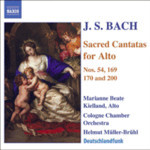
Alto Cantatas Vol. 1 (BWV53, 54, 169, 170, 200)
 $25.00
Out of Stock
$25.00
Out of Stock6+ weeks add to cart
J.S. BACH
Alto Cantatas Vol. 1 (BWV53, 54, 169, 170, 200)
Marianne Beate Kielland (mezzo-soprano) / Koln Bach Vocal Ensemble / Cologne Chamber Orchestra / Helmut Muller-Bruhl (conductor)
[ Naxos / CD ]
Release Date: Sunday 15 January 2006
This item is currently out of stock. It may take 6 or more weeks to obtain from when you place your order as this is a specialist product.
"I strongly recommend acquisition to both period instrument and modern orchestra enthusiasts...a splendid set of performances at super-budget price."
(MusicWeb May 2006)
"In conclusion, this excellent disc is fully the equal of my favorite period instrument recordings by Suzuki, Gardiner, Herreweghe, Koopman, Leonhardt and Rifkin. With sonics that are crisp and appropriately rich, I strongly recommend acquisition to both period instrument and modern orchestra enthusiasts. The sole drawback is the lack of texts, but these can be downloaded from the internet and should not factor strongly in one's decision to purchase such a splendid set of performances at super-budget price."
(MusicWeb May 2006)
Bach's cantatas make up the greatest body of his work, if imperfectly preserved and only later successful in the eyes of posterity. A total of some two hundred cantatas have so far between confirmed, sacred as well as secular functional music (seemingly only three fifths of all his compositions in this genre), written by Bach in over four decades.
The church cantatas are not only associated with the particular readings for each Sunday and feast day in the established church calendar, but also have particular relevance to a leading principle of Lutheran theology, the living proclamation of the Gospel. This, then, is all to do with the word of God, that it is followed and that it raises souls up and refreshes them so that they do not become weary. For Luther, characteristically looking to the simple and the young, that is the true purpose. To this end he writes in 1526 that one must read, sing, preach, write and write poetry, and 'if it were helpful and necessary I would let it sound out with all the bells and play out with all the organs and let everything that can sound, sound out'. Hence music had its direct legitimation in the Protestant rite and indeed in close relationship with the central sermon. It was then predetermined as an effective functional art, to drive the word of God into hearts, as Luther demanded, and it did this over the centuries in changing forms as 'florid music' together with the obligatory congregational singing. Motet forms, sacred concertos, the Protestant song tradition and the influence of opera came together in text and music in some complexity, until about 1700 the definitive form of what was possible was reached (Konrad Küster). Here Bach entered with unparalleled command and created a universe of overwhelming artistic diversity.
This openness in the sense of a continuing independence of musical 'church devotions' together with formal traditions, as was generally perceived by contemporaries and explored with varying degrees of enthusiasm for experiment, is reflected also in Bach's work indications. Given that he generally designated his church pieces according to the plain annual church calendar, he preferred to call them 'concerto'. The term 'cantata' appears only seldom and is found most, not inadvertently, in the titles of his solo cantatas, for example BWV 54, 56, 82 and 170. Although Bach here too anticipates in masterly fashion each form, the use of only a single voice part in alternating aria and recitative, the integration of concertante elements as well as the omission or mere indication of the congregational chorus with the final chorale, relates these to the Italian chamber cantata, to which the title 'Cantata' was then given.
Tracks:
Vergnugte Ruh, beliebt Seelenlust, BWV 170
Widerstehe doch der Sunde, BWV 54
Gott soll allein mein Herze haben, BWV 169
Bekennen will ich seinen Namen, BWV 200
Schlage doch gewunschte Stunde, BWV 53

